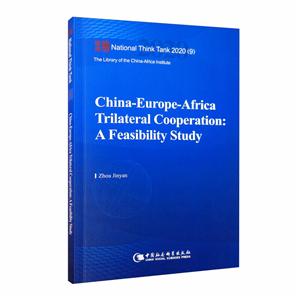-
>
論中國
-
>
中共中央在西柏坡
-
>
同盟的真相:美國如何秘密統治日本
-
>
中國歷代政治得失
-
>
中國共產黨的一百年
-
>
習近平談治國理政 第四卷
-
>
在慶祝中國共產主義青年團成立100周年大會上的講話
中歐非三方合作可行性研究 版權信息
- ISBN:9787520362344
- 條形碼:9787520362344 ; 978-7-5203-6234-4
- 裝幀:一般膠版紙
- 冊數:暫無
- 重量:暫無
- 所屬分類:>>
中歐非三方合作可行性研究 內容簡介
三方合作是在傳統的南北合作和南南合作基礎上的創新合作模式,是溝通南南合作和南北合作的橋梁。此報告主要探討中國、歐洲和非洲在靠前發展合作(又稱發展援助)領域的三方合作。三方合作很早由歐洲援助國在2006年中非合作論壇北京峰會后提出,主要目的是將中國納入歐美的靠前體系,中國不得不被動應對壓力。2014年以后,隨著靠前形勢的變化,中國參與三方合作的政策空間發生了重大變化,中國由被動應對轉變為積極參與,并主動提出“拓展第三方市場合作”的中國方案,中國在靠前舞臺和非洲事務上變得更加積極自信,這為中歐非的三方合作帶來新的契機。中歐非三方合作經歷了政府和政策層面的激辯、相對沉寂和重回政策制定者視野幾個階段。面對美國帶來的逆優選化潮流和優選不確定局面,中歐非三方合作對中美和歐美關系博弈具有權重和砝碼作用。中國和歐洲在非洲沒有戰略性的利益沖突,雙方對非具體政策的分歧在縮小,且均有加強對非事務合作的意愿。此報告旨在介紹三方合作在政策實踐層面的近期新進展,并通過三個具體的國別和行業案例(中英非安全合作、中德非職業教育合作、中歐非醫療合作)研討三方合作面臨的機遇和挑戰,以彌補目前三方合作系統性研究的不足并提出政策建議。三方合作應摒棄意識形態之爭,抓住新契機,從戰略對接到具體政策合作層遞推進,推動具體項目落地,從減貧和農業、公共衛生等爭議較小、意義重大的領域開始,由易而難,循序漸進。
中歐非三方合作可行性研究 目錄
1.1 Changes in the International Situation Concerning Trilateral Cooperation in Africa
1.2 From Passive to Active: China's Changing Attitude Towards the Development of Africa-related Trilateral Cooperation
1.3 Debates on Trilateral Cooperation in Europe Context
Chapter 2 Trilateral Cooperation: A Bridge Between North-South Cooperation and South-South Cooperation
2.1 New Changes in the International Cooperation System
2.2 South-South Cooperation under the Changing International Cooperation System
2.3 The Challenges of New South-South Cooperation and the Need for Trilateral Cooperation
Chapter 3 Necessity and Feasibility of the Trilateral Cooperation among China, Europe and Africa
3.1 China's Policy Towards Africa
3.2 EU Policy Towards Africa
3.3 The Necessity of Strengthening Cooperation between China and Europe in African Affairs
3.4 The Feasibility of Strengthening Cooperation between China and Europe in African Affairs
Chapter 4 Principles and Key Areas of Trilateral Cooperation Between China, Africa and Europe
4.1 Strengthen Cooperation in the Field of Agriculture
4.2 Strengthen Cooperation in the Field of Health Care
4.3 Carry Out Production Capacity Cooperation between China, Europe and Africa
4.4 Strengthen Cooperation in Vocational Training for African Youth
4.5 Enhancing Dialogues on the Maintenance of Peace and Security in Africa
4.6 Take Agriculture and Medical Care as the Starting Point to Advance Trilateral Cooperation
……
Chapter 5 Case Study on Trilateral Cooperation among China, Europe and Africa-China-UK Cooperation in Peace and Security in Africa
Chapter 6 Case Study on China-Europe-Africa Cooperation: China-Germany-Ethiopia Cooperation on TVET
Chapter 7 Case Study of Trilateral Health Cooperation among China, Europe and Africa
Chapter 8 Policy Suggestions
References
中歐非三方合作可行性研究 節選
《中歐非三方合作(英文版)》: 2.3 The Challenges of New South-South Cooperation and the Need for Trilateral Cooperation Compared with North-South cooperation, New South-South cooperation has its own unique advantages, but it also faces the challenges of building its own development knowledge and experience from the perspective of the South, promoting the transfer of parallel experience among the South countries, and coordinating South-South cooperation and North-South cooperation relations. How to innovate the mode of South-South cooperation, provide more public goods for global governance, provide new ideas and solutions for global problems, and actively shape the international cooperation system has become a new mission of South-South cooperation. Trilateral Cooperation has become a powerful way for new South-South cooperation to meet challenges. 2.3.1 Advantages of South-South Cooperation The traditional South-South cooperation is mainly limited to economic and trade cooperation. The areas of new South-South cooperation include not only economic cooperation, but also extensive exchanges between development knowledge and experience on regional governance and state governance, highlighting South-South cooperation, and generating new ideas for developing countries to work together to address the challenges of development. First, mutual learning between South countries is often more effective than one-way knowledge transfer from the North to the South. Different from the top-down knowledge transfer path of cooperation between North and South, South-South cooperation practices a development partnership model of equality and mutual learning. The sharing of knowledge and experience between South-South cooperation is not based on the premise that a country's experience is more advanced than that of another country, but rather that developing countries should seek innovative solutions to development problems through mutual learning and cooperation. At the same time, South-South technical cooperation tends to use capacity development as a process rather than a "product", in which capacity development is embedded as a tool for mutual learning. Second, due to the similar historical background and common development challenges, the exchange of development concepts and ideas between South countries are more meaningful. Emerging economies accumulated a lot of experience in poverty reduction and development. Although the development experience cannot be replicated directly due to different historical experience, development basis and national conditions, the development ideas of emerging economies such as China are worth the reference of the Southern countries. Taking the city Shenzhen of China as an example, at the beginning of reform and opening up, some people also worried about whether the Shenzhen Special Administrative Region would become a colony and whether the development of a market economy would lead to the restoration of capitalism. However, the reformers in Shenzhen were courageous to break the fixed thinking, wade across the stream by feeling the way, and finally achieved brilliant results. In addition to special economic zones, industrial parks and other specific experiences, China's liberation thought, independent exploration in line with her own national conditions of the way of development is more worthy of reference by other developing countries. ……
中歐非三方合作可行性研究 作者簡介
Zhou Jinyan,Assistant Research Professor at the Institute of West Asian and African Studies (IWAAS), Chinese Academy of Social Sciences (CASS). She holds a PhD in international relations from the Graduate School of Chinese Academy of Social Sciences, a M.A. degree of Peace and Security from Institute of Peace and Security Studies, Hamburg University and a Bachelor degree in Law from Tongji University (Shanghai). During her PhD study, she researches in depth the comparison of Chinese and European development cooperation with Africa Previous appointments include program manager at Heinrich Boell Stiftung and political analyst at the European Union Delegation to China During this time she intensively engaged in policy dialogues between European and Chinese governments, think tanks and universities. Her recent work involves development studies, developmental state in Africa, development-security nexus, China's aid and investment in African, trilateral cooperation and African industrialization. She has conducted field trip in Angola and Etluopia and carried out professional travel in India, Pakistan, Malaysia, Kenya, Senegal, South Africa, Morocco, UK, Germany and the United States. She has been invited to present at different international conferences and has fulfilled research projects for the World Bank, DFID, BRICS Policy Center, SAIS-CARI and Chinese government institutions. She is also an alumni of MGG/DIE Germany, ZEIT-Stiftung Ebelin and Gerd Bucerius and India Observer Research Foundation.
- >
龍榆生:詞曲概論/大家小書
- >
上帝之肋:男人的真實旅程
- >
巴金-再思錄
- >
唐代進士錄
- >
苦雨齋序跋文-周作人自編集
- >
史學評論
- >
新文學天穹兩巨星--魯迅與胡適/紅燭學術叢書(紅燭學術叢書)
- >
自卑與超越

















